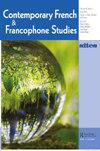Au nom de la mère. Reconfigurations du modèle spiegelmanien du témoignage dans deux récits graphiques sur la guerre civile espagnole
IF 0.2
4区 文学
0 LITERATURE, ROMANCE
引用次数: 0
Abstract
Abstract This paper examines two French graphic novels which reconstruct the Transpyrenean memory of the Spanish civil war: Le Convoi by D. Lapière and E. Torrents (2013), Dolorès by B. Loth (2016). Both works reshape the narrative model of war testimony created by A. Spiegelman in Maus, where the memory of a traumatic past is transmitted between generations within the family circle (postmemory), combining both personal life story and collective History. Focusing on the narratological device of the voice, three major changes are highlighted: the non-actorialization of the author-narrator (unmaking of the autobiographical identity), the feminization of the recipient of the testimony (not a son but a daughter who listens on behalf of a silent mother), and the extension of the family circle beyond a particular family through condensation or displacement. The paper discusses these points studying the stories as well as the paratexts and argues that the specific combination of the three major changes in each graphic novel produces different ways of disjunction between the subjective and the political dimensions of trauma, in other words, between the intimate and the collective sides of History.以母亲的名义。斯皮格尔曼的证词模式在西班牙内战的两个图形叙述中的重新配置
摘要本文考察了两部重建西班牙内战Transpyrenean记忆的法国平面小说:D.Lapière和E.Torrents的《Le Convoi》(2013),B.Loth的《Dolorès》(2016)。这两部作品都重塑了A.Spiegelman在《毛斯》中创造的战争证词的叙事模式,在那里,创伤过去的记忆在家庭圈子内的几代人之间传递(后记忆),结合了个人生活故事和集体历史。围绕声音的叙事手法,强调了三个主要变化:作者-叙述者的非情感化(自传身份的揭露)、证词接受者的女性化(不是儿子,而是代表沉默母亲倾听的女儿)、,以及通过凝聚或置换将家族圈扩展到特定家族之外。本文讨论了研究故事和副文本的这些观点,并认为每部图画小说中三个主要变化的具体结合,在创伤的主观和政治维度之间,换句话说,在历史的亲密和集体方面之间,产生了不同的脱节方式。
本文章由计算机程序翻译,如有差异,请以英文原文为准。
求助全文
约1分钟内获得全文
求助全文
来源期刊

Contemporary French and Francophone Studies
LITERATURE, ROMANCE-
CiteScore
0.30
自引率
0.00%
发文量
43
期刊介绍:
An established journal of reference inviting all critical approaches on the latest debates and issues in the field, Contemporary French & Francophone Studies (formerly known as SITES) provides a forum not only for academics, but for novelists, poets, artists, journalists, and filmmakers as well. In addition to its focus on French and Francophone studies, one of the journal"s primary objectives is to reflect the interdisciplinary direction taken by the field and by the humanities and the arts in general. CF&FS is published five times per year, with four issues devoted to particular themes, and a fifth issue, “The Open Issue” welcoming non-thematic contributions.
 求助内容:
求助内容: 应助结果提醒方式:
应助结果提醒方式:


